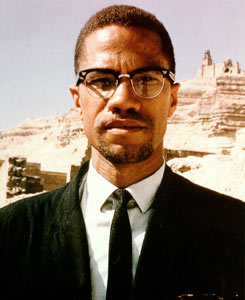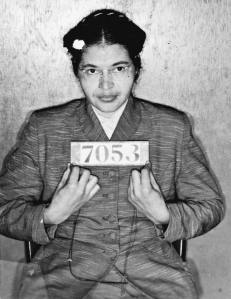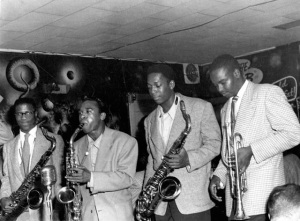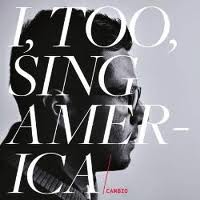On this day in 1965, Malcolm X was assassinated, shot mulitiple times at the podium of the Audubon Ballroom where he was about to address the Organization of Afro-American Unity. Thousands flocked to Harlem over a three-day period to view his body before the burial.
where he was about to address the Organization of Afro-American Unity. Thousands flocked to Harlem over a three-day period to view his body before the burial.
Malcolm Little was born in Omaha, Nebraska in 1925 into a Baptist family; his father was a follower of Marcus Garvey and educated his son on all matters of black pride. While serving a prison sentence in the 1950s, he learned about the Nation of Islam and began a correspondence with Elijah Muhammed; by the time of his release he’d joined the organization and changed his name to Malcolm X. An immediately charismatic leader at Temples one, 10, 12, and seven, his musician following included Etta James, Johnny Otis and saxophonist Archie Shepp. In 1964, he left the NOI and made his way to Mecca. As a Sunni Muslim, El-Hajj Malik El-Shabazz came to believe that Islam was the way toward racial harmony.
Twenty years after his death, the legacy of Malcolm X had largely not been passed down to the next generation; certainly, his contribution to the black liberation cause had not been fully incorporated into history texts despite the perennial popularity of the considered classic, The Autobiography of Malcolm X, a collaboration with Alex Hayley. But leave it to music—in particular Public Enemy—to recognize and close the gap. The New York hip hop collective began to use Malcolm X’s teachings and speeches in concert with their videos and recordings (Boogie Down Productions and KRS-One and Spike Lee’s film, Malcolm X, also played a major role in the comeback; the efforts were not without controversy at the time).
Chuck D has said Public Enemy was partly founded on the idea of “connecting the dots” for those unfamiliar with the depth of black history; hard information is tightly packed into their raps that raise a fist in the name of consciousness. Of course this all happened back in the highwater era of Reagan and Bush, or what you might call the beginning of the middle of the end: As the nation enjoyed its boom-time and Michael Jackson paid a visit to the White House, the holiday for Dr. King was still left unrecognized by all 50 states, and the disconnect had only just begun. This year, smack dab in the middle of black history month, Nikki Minaj misappropriated the famous image of Malcolm X holding a gun, in defense of his family; Black media voiced its concern, the Shabazz family threatened legal action and Minaj rethought her plan. Hip hop is generally removed from its mission to educate and there is still no holiday in the name of Malcolm X. Instead, his civil and human rights works are officially recognized by films, speeches, books and songs. In addition to the Hayley book, Malcolm X: A Life of Reinvention by Manning Marable is the considered definitive biography. James Cone’s Martin & Malcolm & America: A Dream or A Nightmare is a comparison study of the pair’s liberation strategies. This musical tribute from musician, poet and educator, Archie Shepp, taken from his 1965 album, Fire Music, was recorded as an elegy soon after the assassination. A reading from Keep on Pushing follows.
Filed under: Archie Shepp, Arts and Culture, Civil Rights, film, Hip Hop, Jazz, Malcolm X, Poetry, video, Alex Hayley, Boogie Down Productions, Chuck D, KRS-One, Manning Marable, Nikki Minaj, Public Enemy, Spike Lee






